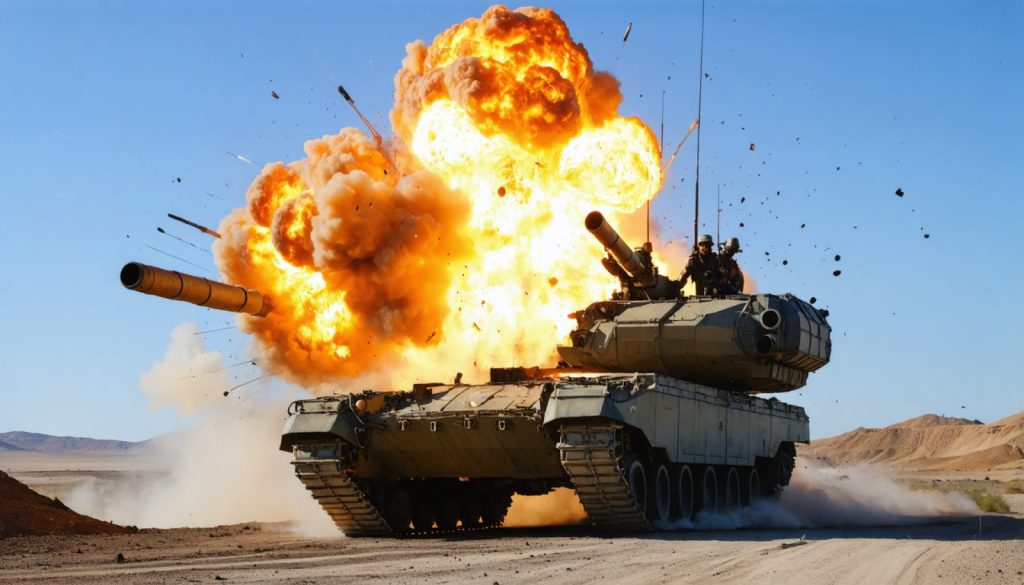
- HR Smith Group is accused of supplying sensitive technology to Russia through an Indian enterprise, drawing global scrutiny.
- The company rebuffs these allegations, upholding its commitment to compliance.
- The controversy centers around technologies restricted due to sanctions against Russia amid the Ukraine conflict.
- A Harmonized System code allegedly links HR Smith to the technology transfer, a claim the company disputes as misleading.
- Hindustan Aeronautics Limited (HAL) is implicated as the conduit, with unverified allegations of its involvement with a Russian arms dealer.
- The situation underscores the broader implications for international trade compliance and media responsibility.
- The case highlights the need for rigorous journalism to verify information before making public accusations.
As the gears of international trade grind amidst geopolitical tensions, the alleged involvement of British aerospace manufacturer HR Smith Group in an illicit technology transfer drama has ignited a fiery debate. A recent report accused the company of supplying sensitive technologies to Russia through an Indian state-run enterprise, raising eyebrows across the globe. Yet, the accused parties swiftly stepped forward, dismissing the story as nothing more than a tempest in a teapot.
HR Smith Group, with its sterling reputation for upholding the highest standards of compliance, stood firm against what it claims are entirely baseless allegations. The focal point of the controversy? Transmitters, cockpit equipment, and various technologies allegedly rerouted to Russia—a country currently under stringent import bans by both the UK and the US due to the ongoing conflict in Ukraine.
The luminescent trail of suspicion laid out by the report hinges on a Harmonized System code, a complex international product classification system. This code, akin to a shadowy specter, appears to have linked HR Smith Group to the alleged technology transfer. Yet, the company insists that such an approach paints a misleading picture, arguing that the code alone cannot definitively trace a product’s journey or identify its intended use.
Central to the allegations is Hindustan Aeronautics Limited (HAL), a behemoth in India’s aerospace sector. Allegedly, shipments flowed through HAL to Rosoboroneexport, a Russian arms dealer painted in a stark shade of embargoed black by Western nations. Despite the serious nature of these claims, HAL remains silent, though sources within the company have dismissed the report as misleading and politically charged.
The implications of such allegations resonate far beyond the corporate corridors of HR Smith or HAL. They tap into the heart of strategic trade controls, a delicate dance of diplomacy where every move can reshape alliances. The core message reverberating through this clash of narratives is one of diligent introspection: the necessity for news organizations to tread carefully and validate their findings before stoking international fires.
In an era where truth and convenience compete for dominance, the HR Smith debacle stands as a stern reminder of responsible journalism’s critical role. The clash of facts and fiction in the digital age demands that media outlets hold their magnifying glass steady, ensuring clarity rather than distortion in a world where truth remains as vital as the air we breathe.
Beneath the Surface: Exploring the HR Smith Allegations and Global Trade Dynamics
Understanding the Geopolitical Landscape
In the world of international trade and technology transfers, the landscape is ever-shifting, dictated by intricate geopolitics and stringent compliance measures. The recent allegations involving the British aerospace firm HR Smith Group and the supply of sensitive technologies to Russia through India’s Hindustan Aeronautics Limited (HAL) have sparked a critical discussion about the complexities of global trade, compliance, and strategic diplomacy.
HR Smith Group: A Legacy of Compliance
HR Smith Group is renowned for its adherence to international compliance standards, particularly in the aerospace industry. The allegations hinge on the use of a Harmonized System (HS) code, an international product classification system that can offer insights into trade patterns but is limited in revealing the full story of a transaction. According to industry experts, the HS code is a starting point for investigation but not conclusive evidence of illicit activities.
The Role of Hindustan Aeronautics Limited (HAL)
HAL, a significant player in India’s aerospace sector, is purportedly linked to these allegations through the supposed rerouting of equipment to Rosoboroneexport, a Russian entity subject to Western sanctions. While HAL has not officially commented, insiders claim that the accusations are politically motivated and unfounded.
Strategic Trade Controls and Compliance
The essence of this controversy lies in the broader implications for strategic trade controls. Modern geopolitical tensions require robust compliance regimes where companies must diligently monitor and control their supply chains. This is a delicate balance, requiring cooperation between nations, companies, and governing bodies to ensure each transaction complies with stringent export laws.
Market Trends and Industry Outlook
The aerospace and defense industry’s growth is closely tied to geopolitical stability and innovation in technology. The ongoing situation with HR Smith and HAL underscores the importance of transparent supply chains and diligent compliance. According to the Aerospace Industry Association, global aerospace and defense markets are projected to grow, emphasizing increased surveillance and stricter compliance measures.
Controversies and Limitations
One of the main controversies surrounding this debate is the reliability of media reports. The alleged technology transfer, if substantiated, would not only impact the companies involved but also strain diplomatic relations across nations. The limitation lies in the reliance on HS codes for verification, which requires further corroboration through regulatory oversight and direct evidence.
How-To Steps for Ensuring Compliance
Companies looking to maintain compliance in international trade can consider the following steps:
1. Conduct Regular Audits: Ensure all transactions adhere to international and national regulations.
2. Implement Comprehensive Training Programs: Equip employees with the necessary knowledge to identify and prevent illicit transfers.
3. Employ Advanced Technology Solutions: Use AI and blockchain to enhance supply chain transparency.
4. Engage in Continuous Dialogue with Regulators: Maintain open lines of communication with trade regulatory bodies to stay informed of changes.
Actionable Recommendations
1. Vigilance in Monitoring: Businesses should establish internal controls and monitoring systems to track product flow through supply chains.
2. Strengthen Compliance Frameworks: Regularly review and bolster internal policies to align with global standards.
3. Educate Staff: Offer continuous training on the legal implications of global trade and technology transfers.
Conclusion
The HR Smith Group allegations highlight the criticality of transparency and compliance in international trade. As geopolitical tensions persist, companies must remain vigilant, implementing stringent internal controls to prevent inadvertent violations. This situation serves as a vital reminder of the significance of responsible journalism in disseminating information that can facilitate or fracture international relationships.
For more on international trade and compliance standards, visit the Aerospace Industries Association.



